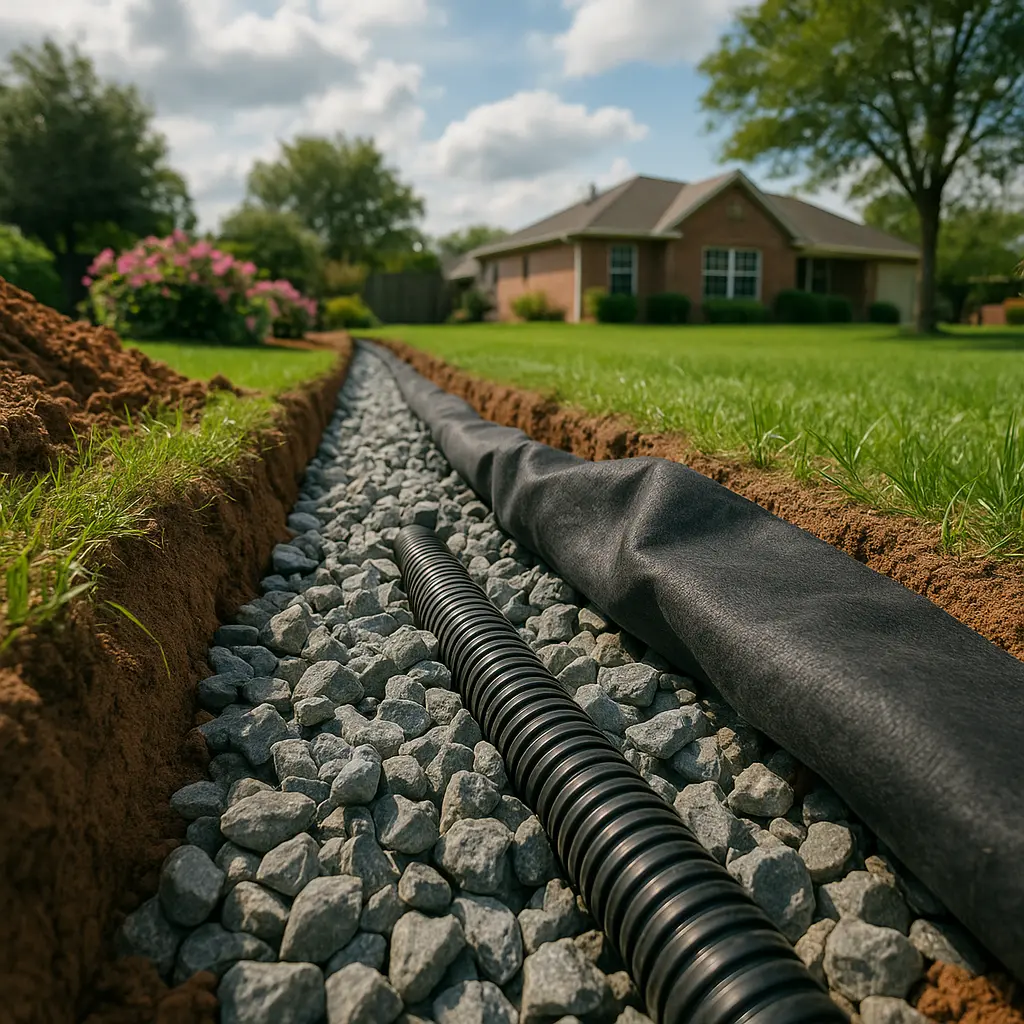 With record-setting spring thunderstorms and increasingly unstable soil conditions in North Texas, protecting your property from water damage has never been more important. Proper drainage plays a vital role in preventing costly structural issues, including foundation cracking and mold growth inside your home.
With record-setting spring thunderstorms and increasingly unstable soil conditions in North Texas, protecting your property from water damage has never been more important. Proper drainage plays a vital role in preventing costly structural issues, including foundation cracking and mold growth inside your home.
The most effective method to eliminate unwanted standing water is to install a French drain system using slotted pipes, filter fabric, and gravel. Older systems lacked these essential components, leading to clogs from accumulated soil and sand over time.
When installed correctly, a French drain channels water away from your home’s foundation. This is best accomplished using perforated drainage pipes with long, narrow slits rather than small round holes, as slotted pipes reduce the amount of fine soil particles that can enter the system.
Best Types of Gravel for French Drains
The gravel used in your French drain significantly impacts its effectiveness and lifespan. Below are three of the best materials available at KK Ranch Stone & Gravel:
Pea Gravel
Pea gravel is a common choice for French drains due to its smooth, rounded texture and small size. Pea gravel promotes excellent drainage while minimizing compaction, making it ideal for areas with foot traffic or landscaping equipment.
Washed Rock
Washed rock has been thoroughly cleaned to remove fine particles that can cause clogs. This clean, angular aggregate allows water to pass through freely, making it a reliable option for both residential and commercial French drain systems.
Septic Rock
Also known as leach rock or drainage rock, Septic rock is naturally porous and made up of mixed-size stones. It’s excellent for filtering out debris while maintaining water flow, especially in areas prone to excessive rainfall.
Steps to Installing French Drains
- Dig a trench alongside your foundation at least 2 feet wide. Depth may vary—up to 6 feet for basements, or as shallow as 2 feet for slab-on-grade homes.
- Place the slotted drainage pipe directly on undisturbed soil, sloping it away from the home to encourage gravity-assisted drainage.
- Cover the pipe with a minimum of 12 inches of washed rock.
- Lay filter fabric over the gravel to prevent soil infiltration and clogging.
- Backfill the trench with topsoil and compact it to original grade level.
Benefits of Installing French Drains
Effective Drainage
French drains efficiently collect and redirect water, protecting your foundation and landscaping.
Preventing Water Damage
They help mitigate mold, rot, and structural decay by preventing water from pooling near your home.
Cost-Effective
Compared to other drainage systems, French drains are affordable to install and require minimal upkeep.
Versatility
They are suitable for residential yards, commercial developments, and even industrial properties.
Long-Lasting
With the right materials like septic rock or pea gravel, these systems can last for decades.
Improved Landscaping
Prevent erosion and waterlogging in flower beds, walkways, and lawn areas.
Increased Property Value
By protecting your foundation and enhancing curb appeal, French drains can raise your home's market value.
North Texas French Drain Benefits
In North Texas, frequent droughts followed by intense thunderstorms create the perfect storm for soil instability and water intrusion. The region’s clay-rich soil expands and contracts with moisture levels, increasing the risk of foundation cracks and drainage failures.
Installing a properly constructed French drain system can help stabilize your property, reduce long-term repair costs, and protect your home from unpredictable weather patterns in Johnson County and surrounding areas.
French Drain FAQs
Do French drains work in Texas soil?
Yes — especially in areas like Johnson County, where expansive clay soil shifts dramatically between rain and drought cycles. Installing a French drain helps prevent foundation cracks, standing water, and long-term drainage issues.
Can I install a French drain myself?
Yes, you can — with proper planning and the right materials like slotted pipe, filter fabric, and clean gravel. It’s important to slope the pipe correctly and use high-quality aggregates.
What’s the difference between washed rock and septic rock?
Washed rock is thoroughly cleaned to remove fine particles that can clog your drainage system. Septic rock, on the other hand, is a mix of porous, variable-sized stones designed to allow water to pass through easily. Both are excellent choices for French drains depending on your specific drainage goals and budget.
